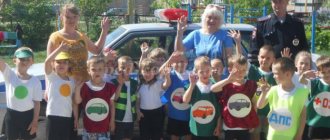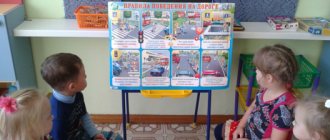Pictures of road signs
Clear drawings of signs with analogies will help you remember the most important symbols that you will encounter on your way to elementary school or kindergarten. Vivid images and simple explanations allow you to instantly attract attention and convey information quickly, cheerfully and clearly.
Thanks to road pictures, the child learns to be independent and make the right decisions. The main goal is to show that participation in traffic is not as scary as it may seem. If you understand the meaning of road signs, you can organize your own actions.
Road pictures are different for each age category. Children learn in the presence of an adult, who prompts actions and explains signs.
Road alphabet, or for children about traffic signs
Cars, roads with active traffic, pedestrians, traffic lights - surround us since childhood. And the adult world knows how dangerous it can be on the road and how important traffic rules are. Moreover, they are important not only for drivers, but also for other road users. Today we will tell the children about traffic signs.
It is advisable to teach a child the rules of the road from the age of 3, but it is important to remember that he absorbs our example even when he is sitting in a stroller))). In addition to the rules, it is important to tell children about types of transport, what braking distance is and why it is sometimes not as fast as we would like...
It should be taken into account that until the age of eight, tunnel vision predominates in a child, that is, the child does not notice what is on the sides, he sees only what is in front, and therefore he needs to be explained, and even several times, that before crossing the road, you need to look left and right.
Basic rules for a pedestrian:
Telling children about the rules of the road starts with the rules for pedestrians. After all, at first each of us is a pedestrian.
- You need to walk exclusively on the sidewalk, on the right side.
- You need to cross the street at a pedestrian crossing if there is no traffic light.
- If there is a traffic light, you need to cross the road when the signal is green.
- If the traffic light opposite you is yellow or red, under no circumstances should you cross the street.
- You definitely need to look around to see if there are any cars and only then cross the road.
- If you are outside the city where there is no sidewalk, you need to walk along the side of the road away from traffic.
Traffic signs
Today we will pay close attention to traffic signs. We will not only show them and talk about them, but also read good poems about traffic signs. We see many signs on the roads. It is important when walking with children, crossing streets on foot or by car, to pay attention to the signs. You need to explain their meaning and try to get the child to remember what the sign looks like and what it says. You can start talking about them as early as 5 years old.
Let's look at the traffic signs that children need to remember first. Let's look at 6 types of traffic signs.
When the number of cars, trucks, buses and other types of transport began to increase on the roads, a unique language was created. When trams ran through the streets, cars, trolleybuses, buses rushed, the streets had to be given a language. This road language is spoken to drivers and pedestrians on the streets of all countries of the world.
Road language is special signs of different shapes and colors that convey vital information to drivers and pedestrians. Road signs are divided into groups, uniting them by content. For example:
1.Warning signs
These signs warn us of danger and are designed to increase our attention. Warning signs, for the most part, have the shape of a triangle with a red border around the perimeter. They warn us that there is a dangerous turn ahead, or a railway crossing, or there are children nearby - a school or kindergarten.
Traffic light regulation sign
Red, yellow and green - This is the voice of the traffic light. He says: “Stop! Kati! If yellow - “Wait!”
A traffic light is drawn inside the triangle. This sign warns of approaching a section of the road controlled by a traffic light. Do not under any circumstances cross the road when it is red. If the light turns yellow, you need to wait, but when the light turns green, you need to look around and calmly cross the road.
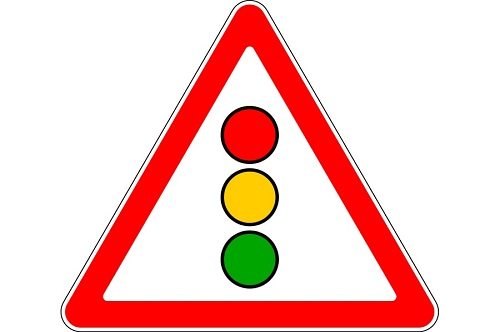
Pedestrian crossing sign
On the pedestrian path, only feet walk. Only in a stroller, kids can ride slowly.
Inside the sign there is a drawing of a man crossing the road at a zebra crossing. Next to this sign there is always a pedestrian crossing, that is, a zebra crossing. This means you can cross the road, but don’t forget to look to the right and left before you take a step along the zebra crossing.
Sign "Caution - Children"
Hey, driver, be careful, It’s impossible to drive fast, People know everything in the world. Children walk in this place.
Running children are painted inside the sign. Usually these signs hang near children's institutions, such as schools, kindergartens, camps, etc.
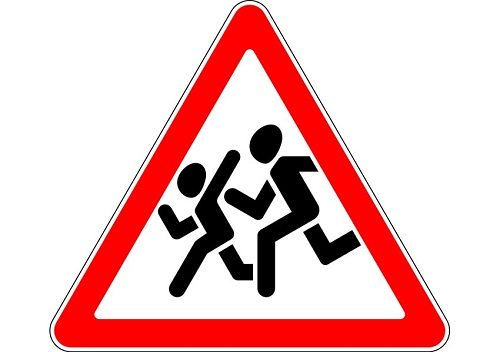
Dangerous turn sign
This sign sounds the alarm - Here is a dangerous turn! Of course, you can drive here, but only very carefully - do not overtake anyone, do not change passengers.
This sign indicates a dangerous section of the road with a sharp, difficult to see turn.
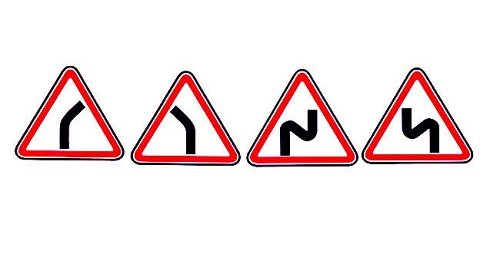
Priority signs.
These signs tell us the correct order of passage for a certain section of the road. They come in different shapes and colors. As a rule, their effect applies more to drivers. Among the priority signs are the following:
Main Road Sign
Here is a sign, of which there are few: This is the main road! If you drive along it, you become more important than everyone else, and, as if to God, everyone makes way for you!
Indicates the road with priority.
Give way sign
Changeling on the way Means, give in. Turned the triangle, Pay attention, schoolboy! Where the driver meets a sign, he gives way.
It is important not only for drivers, but also for pedestrians to know the “Give Way” sign. This is the only inverted triangle among the signs and it tells us that we are approaching the main road and must yield.
STOP sign
You, driver, don't rush, you see the sign, stop! Before you continue your journey, don’t forget to look around.
Indicates that drivers must stop for 5 seconds. After which you can continue moving. As a rule, this sign is installed in front of posts, customs and railway crossings.
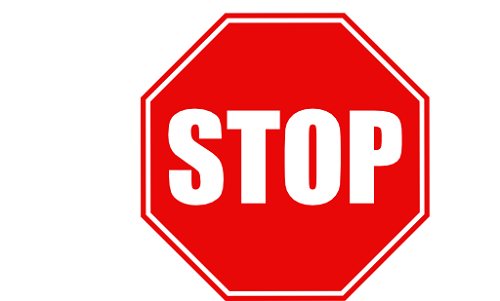
Prohibition signs.
The very word “prohibiting” speaks for itself. These are signs that restrict road traffic. They look like a round sign in a red frame.
No Bicycles Sign
The sign looks strictly at everyone, It strictly forbids us to ride bicycles and their relatives - mopeds.
There is a bicycle inside the sign. This means that you cannot ride a bicycle on this section of the road.
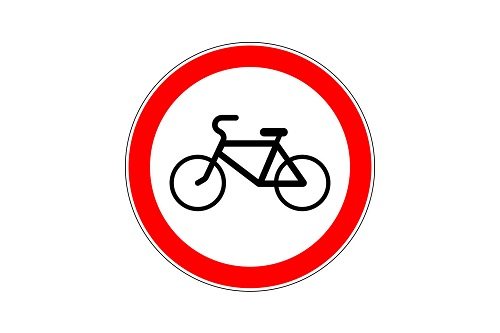
Sign "Pedestrian traffic prohibited"
No pedestrians walk here in rain or shine. The sign tells them one thing: “You are prohibited from walking!”
A pedestrian is drawn inside the sign, crossed out with a red line. In this case, you cannot walk on this section of the road.
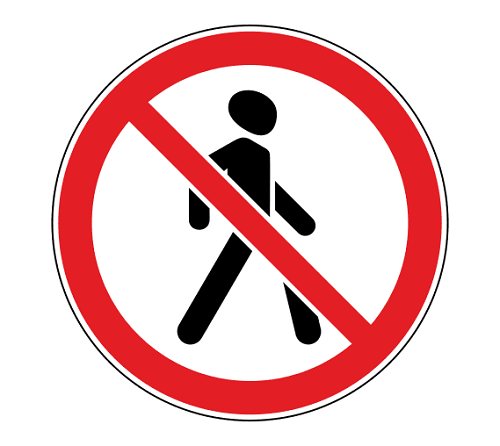
"No entry" sign.
The sign scares drivers and prohibits entry for cars! Don't try to rush past the brick!
This “brick” - as it is popularly called - is known to everyone. After all, it prohibits the entry of all vehicles in this direction, including bicycles.
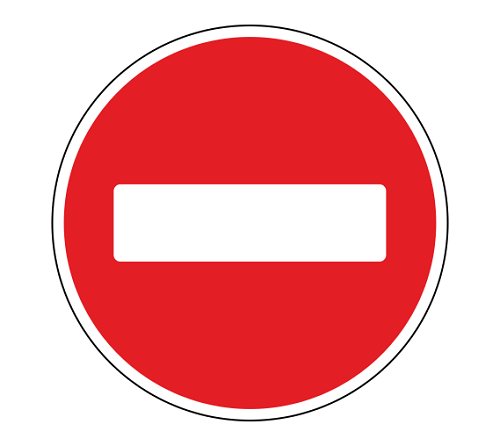
Mandatory signs.
These are, so to speak, recommended signs. They can be canceled as unnecessary, or installed if necessary. They can be either round, triangular or square, and are usually painted blue.
Bicycle path sign
This sign is like a red light, there is no way for cars here. The kingdom here is of bicycles, pedestrians and mopeds.
Bicycle path Overtake Maxim Seryozhka. No one will bother you - All children know this sign.
Blue circle with a bicycle pattern. This means that on this stretch of road it is safe to ride and learn to ride a bike.
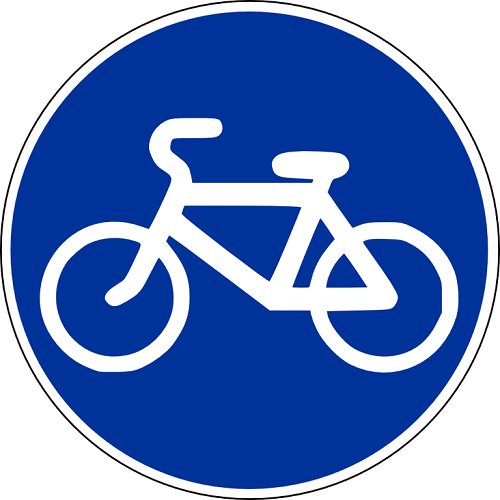
Pedestrian path sign
The sign tells us: “Friends! You can’t drive here at all!” Those who are familiar with the signs only walk past.
A blue sign, in the form of a circle, with a drawn man. This means that this section of the road is for pedestrians only.
Information and directional signs
Signs on blue squares indicate where an underground, overground or pedestrian crossing is located.
Sign "Underground pedestrian crossing"
A long entrance leads down from the sidewalk. Under the road. There is no door or gate - It's an underground passage.
Inside the blue square, there is a drawing of a man walking down the steps. This means that next to you is not a zebra crossing, but an underground passage. There is also a sign where a person is climbing steps, this means that the pedestrian crossing is above the road.
Dead End sign
This sign will surely lead to a dead end. Well, then at least fly, Because there is no way!
In the blue square there is a road at the end of which there is a red brick. This means that at the end of the road there is a dead end, it is better to go around the road from another street.
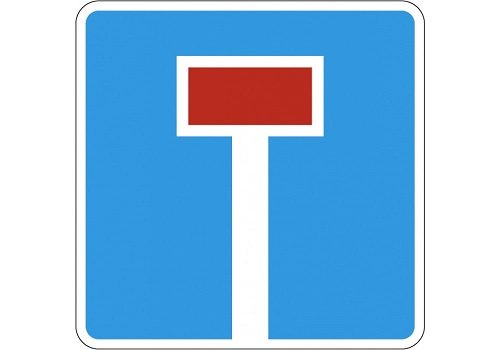
Pedestrian crossing sign
Everyone knows the stripes. Children know, adults know. A pedestrian crossing leads to the other side.
A blue square with a white triangle inside it with a pedestrian on a zebra crossing. Everything is clear here, we cross the road at the zebra crossing, but don’t forget to look both ways.
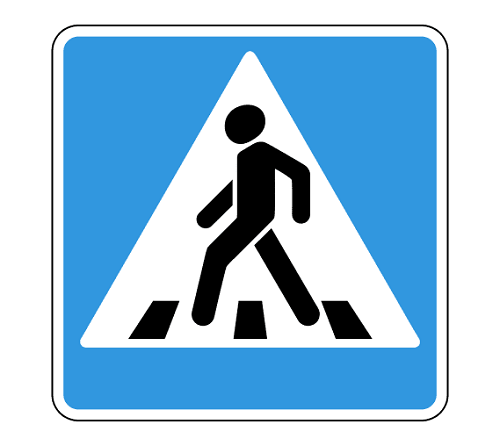
Service Marks.
Another large group of informative signs are service signs. These are blue rectangle signs with pictures: a spoon and fork, a bed, a red cross... They colorfully indicate that a first aid station, a resting place or a hotel is nearby.
First aid station sign
If someone breaks their leg, doctors here will always help. They will provide first aid, and they will tell you where to go for further treatment.
Inside this white square is a red cross. This means there is a clinic or hospital nearby.
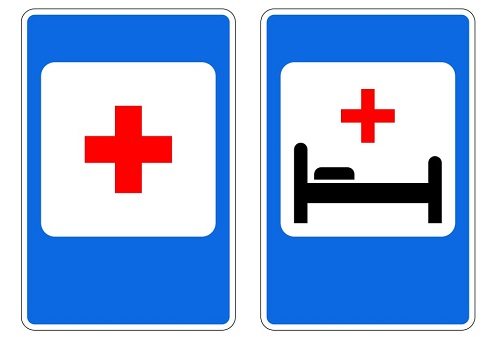
Sign "Food station"
Here is a fork, here is a spoon, We refueled a little, We fed the dog too... We say “thank you” to the sign.
Also inside this white square are cutlery, a fork and a spoon. This means there is a cafe or canteen nearby, or maybe a restaurant.
Stop sign
Stop, crowd of people. The bus will arrive soon. City transport is waiting here, going to the office, to the workshop, to home. They go to school, kindergarten, on holiday they go to the parade. In the street cycle Urban transport is held in high esteem!
There is a picture of a bus in a white square. This means you can wait for public transport near this sign.
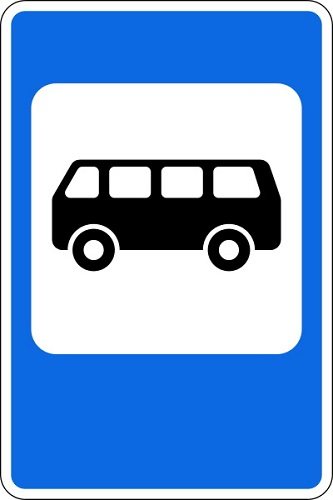
Recreation area sign
If you are tired on the road, If you go far, Rest a little driver, There is a place reserved here.
You can also see a sign with a Christmas tree and a bench inside this square. This means you can spend your holiday in nature there.

These are the main groups of road signs with which you need to start teaching your child the road alphabet. Further more! Traffic signs are the alphabet of the roads, a unique language for drivers and pedestrians from all over the world! The article and explanation were adorned with poems about traffic signs by Olesya Emelyanova.
With modern toys it is simply magical to teach children the rules of the road. Don't believe me? Watch this educational cartoon about traffic signs with your whole family:
Here is a traffic alphabet in which letters and phrases make up traffic signs. Be sure to teach your children about traffic signs. This science is perhaps even more important than the history of geography. After all, it is not on the map, but in life. Safety comes first!
More about traffic rules for children:
Children's riddles about traffic rules
Poems about traffic rules for children
Children about the basic rules of the road.
Children about transport. History of transport
Poems and riddles about transport
Curious and active children to you!
With love,
"Flowers of life".
Pictures of traffic rules for children
This is a fun activity for different age groups, which at the same time brings great benefits. Every child, just starting to walk, becomes a participant in traffic - goes to kindergarten or school, walks in the yard, learns to ride a bicycle. Studying from strict books is boring and difficult, so as an alternative we offer bright drawings with clear messages.
The learning process attracts the child with its accessibility and diversity. Any adult can help understand the images by adding examples from personal experience to the drawing. As a result, confidence in himself and his actions in any situation is formed, he will not be confused or scared at the sight of a moving car and will know what to do at a pedestrian crossing. Traffic rules drawings are quick answers to children's questions.
Road alphabet in pictures
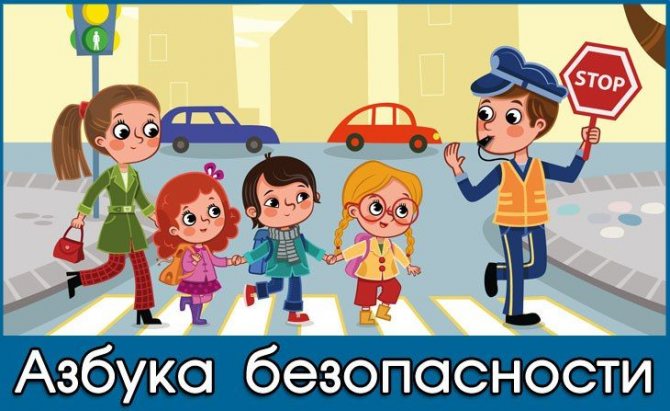
This is play-style learning. Vivid images are better remembered and attract children's attention better than dry texts and abstruse phrases. This alphabet has a dual function - visual teaching of literacy plus familiarization with road traffic and its participants. The child will easily remember the order of letters in the alphabet and their spelling, and will also know the designations of markings, signs, vehicles, etc.
The participation of an adult in the process of learning the alphabet can only be limited to testing the acquired knowledge. Colorful pictures and simple explanations are learned by children of different ages. As a result, the child is well oriented in traffic situations, learns in which places to cross the road, and will be able to distinguish between traffic lights and road sign designations.
Non-existent road signs
This is a great conceptual way to develop a child's understanding of the world. Based on simple drawings, the child develops logical thinking, associative perception, and adapts to social life. Road traffic is an integral part of modernity, vehicles and pedestrians intersect everywhere. Understanding the basics of traffic rules means being safe.
Pictures with non-existent road signs are beneficial because they develop in the child an idea of real symbols that need to be followed. At the same time, fantasy develops thanks to imaginary objects. Children easily reproduce or invent new colorful images. This learning process is built in a game format and is preparatory to further study of the signs from the Rules.
Child on the road
A child is alone on the street... So he runs up to the road to catch up with a runaway ball, and then a huge truck rushes towards him... Surely every parent has had such a terrible dream in their life at least once.
To prevent this nightmare from becoming a reality, it is necessary to begin teaching a child the correct behavior on the road from a very early age, long before he goes out on his own, unaccompanied by adults. Many methods have been developed to help parents learn; there are also special road signs for children, of course, toy ones, but do not forget that the child’s education should be of a playful nature. It is in the game that he will learn new material, new information much easier. Where is the best way to start learning?

